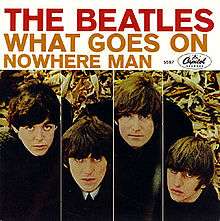What Goes On (Beatles song)
| "What Goes On" | |
|---|---|
| Song by the Beatles from the album Rubber Soul | |
| Released | 3 December 1965 |
| Recorded |
4 November 1965, EMI Studios, London |
| Genre | Country rock |
| Length | 2:50 |
| Label | Parlophone |
| Writer(s) | Lennon–McCartney/Starkey |
| Producer(s) | George Martin |
| "What Goes On" | ||||
|---|---|---|---|---|
 | ||||
| Single by The Beatles | ||||
| A-side | "Nowhere Man" | |||
| Released | 15 February 1966 | |||
| Format | 7" | |||
| Recorded |
4 November 1965, EMI Studios, London | |||
| Genre | Country rock | |||
| Length | 2:50 | |||
| Label | Capitol | |||
| Writer(s) | Lennon–McCartney/Starkey | |||
| Producer(s) | George Martin | |||
| The Beatles US singles chronology | ||||
| ||||
"What Goes On" is a song by the Beatles, featured as the eighth track on their sixth British album Rubber Soul. The song was later released as the B-side of the US single "Nowhere Man", and then as the tenth track on the North America-only album Yesterday and Today. It is the only song by the band credited to Lennon–McCartney-Starkey.
Composition
The original version of the song was written by John Lennon in the Quarrymen days[1] and considered as a follow-up to "Please Please Me" in early 1963.[2] The song was not used until 1965 as Ringo Starr's vocal piece for Rubber Soul. According to Lennon, "it was resurrected with a middle eight thrown in, probably with Paul's help" for Rubber Soul.[1] Barry Miles also claimed that McCartney and Starr combined for the middle eight.[3] There is no formal middle eight in the song, though one chorus and one verse are extended; Ian MacDonald believes those longer sections were written by McCartney.[4] Starr contributed to the lyrics, his first-ever composing credit on a Beatles song. However, when asked what his contribution was to the song, Starr jokingly stated, "About five words, and I haven't done a thing since."[3] To his chagrin, the first pressing of the single accidentally omitted "Starkey" in the song-writing credit.
Recording
An early version was considered as a follow-up to "Please Please Me", and the Beatles hoped to record it on 5 March 1963, but there was only time for the other songs recorded that night: "From Me to You", "Thank You Girl", and an early version of "One After 909".[2]
The Rubber Soul version was recorded in one take, with overdubs, on 4 November 1965. In the verse before the lead break after Starr sings "tell me why," Lennon can be heard saying "We already told you why!" in reference to the Beatles' "Tell Me Why" from the previous year. During this session the Beatles recorded a long (6:36) instrumental tune called "12-Bar Original" for lack of a better name.[5] "12-Bar Original" was not included on Rubber Soul, and was not commercially available until 1996 when an edited version of take 2 of this song was included on the Anthology 2 album.
Personnel
- Ringo Starr – lead vocal, drums
- John Lennon – harmony vocal, rhythm guitar
- Paul McCartney – harmony vocal, bass
- George Harrison – lead guitar
- Personnel per Ian MacDonald[6]
Reception and reviews
Richie Unterberger, in AllMusic, says the song is an enjoyable, but lightweight, country & western-flavoured entry in The Beatles catalogue. Unterberger praises George Harrison's guitar work, which "again marks him as the finest disciple of Carl Perkins,"[7] and the guitar work is indeed similar to "Everybody's Trying to Be My Baby", a Perkins cover version released on Beatles for Sale.
Cover versions
- In 2005, Sufjan Stevens covered the song on the compilation This Bird Has Flown - A 40th Anniversary Tribute to the Beatles' Rubber Soul. Stevens' version only keeps the lyrics of the original, as he takes his own interpretation on the melody and arrangement.[8]
- In 2006 and 2008, Starr performed "What Goes On" live with each year's All Starr Tour.
- In 2013 DJ Steve Funk covered the song solo acoustic in 3/4 waltz time. (Available on Soundcloud).
Notes
- 1 2 Sheff 2000, p. 178.
- 1 2 Lewisohn 1988, p. 28.
- 1 2 Miles 1997, p. 275.
- ↑ MacDonald 1994, p. 142.
- ↑ Lewisohn 1988, p. 67.
- ↑ MacDonald 1994, p. 176.
- ↑ Unterberger 2007.
- ↑ Pitchfork 2009.
References
- Lewisohn, Mark (1988). The Beatles Recording Sessions. New York: Harmony Books. ISBN 0-517-57066-1.
- MacDonald, Ian (1994). Revolution in the Head: The Beatles' Records and the Sixties. New York: Henry Holt and Company. ISBN 0-8050-2780-7.
- Miles, Barry (1997). Paul McCartney: Many Years From Now. New York: Henry Holt & Company. ISBN 0-8050-5249-6.
- "Review of "This Bird Has Flown: A Tribute to the Beatles' Rubber Soul"". Pitchfork. 2009. Retrieved 15 April 2009.
- Sheff, David (2000). All We Are Saying: The Last Major Interview with John Lennon and Yoko Ono. New York: St. Martin's Press. ISBN 0-312-25464-4.
- Unterberger, Richie (2007). "Review of What Goes On". Allmusic. Retrieved 26 February 2007.
- "What Goes On". The Beatles Bible. 2008. Retrieved 15 April 2008.